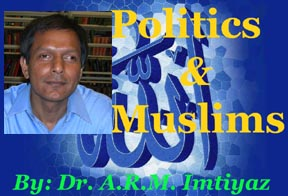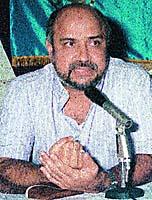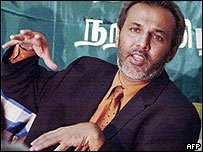Ilankai Tamil Sangam30th Year on the Web Association of Tamils of Sri Lanka in the USA |
|||
 Home Home Archives Archives |
The Sri Lanka Muslim CongressThe Logic of Politicsby Dr. A.R.M. Imtiyaz, Sri Lanka Guardian, October 4, 2007
Sri Lanka Muslims regardless of their geographical location supported candidates (including those of Muslims) who win the tickets from the mainstream political parties. They did not encounter any pressure to challenge the mainstream parties such as the United National Party (UNP) or the Sri Lanka Freedom Party (SLFP). Interestingly enough, these parties outbid each other (mainly on the anti-Tamil programs) to win the Sinhalese votes. However, deepening ethnic conflict and the lack of trust in the traditional Muslim leadership pushed the North and east Muslims to seek their own regional-oriented ethnic party. They found Mr. Ashraff led Sri Lanka Muslim Congress (SLMC) would help win justice and security. This article focuses on the origin and development of the SLMC to gain some basic understanding about the Muslim politics.
The SLMC had mosques as its base, particularly in the ethnically mix but politically volatile East. The leaders of the party began their emotional political speeches and election campaigns by proclaiming Islam’s basic teachings and Quranic verses such as “Laelaha Illallah Muhammadur Rasulallah” (Allah is the One and Mohammed is his messenger. Needless to say, such emotional religious appeals attracted the economically deprived and politically marginalized North-East Muslims. It mainly identified the Tamil polity as the primary enemy of the Muslims and attempted to cohabit with the Sinhalese polity, a kind of tactic successfully employed by its South centered predecessors. The SLMC’s growth and tactics had goaded the Tamil Tigers. Thus, to contain the activities of the SLMC, the Tamil Tigers outlawed the SLMC and listed Mr. Ashraff in its hit list. The Tamil Tigers’ approach annoyed the SLMC. Mr. Ashraff’s following statement well proved his resentment against the Tamil Tigers:
Mr. Rauf Hakeem, key charismatic leader of the SLMC, filled the leadership gap when Mr. Ashraff life was concluded with tragic air accident on September 16, 2000. Mr. Hakeem who hails from the central Sri Lanka decided to follow in the footsteps of late Mr. Ashraff with some notable flexibility. He met the LTTE boss, Mr. Pirabkaran on the 13th of April, 2002 and signed landmark Memorandum of Understanding (MoU). The MoU promised some reconciliation between the Tamils and the Muslims. But critiques did not suggest any radical improvements in the region. Muslims did not have reasons to lose the confidence in the MoU because the LTTE as promised did not take any practical measures to give back the lands they captured from the Muslims of the East nor did it take practical measures to eliminate the fears of the Muslims towards the LTTE. On the other hand, Muslim politicians or the SLMC found difficulties to abandon their pro-Sinhala polices, and thus contributed to the growth of Tamil suspicion towards the Muslims. Essentially, the death of Mr. Ashraff deeply disturbed the unity of the SLMC. Several factions emerged within the party’s ranks. Many believed that Muslim political representatives had lost the common program to win security and rights for Muslims: they failed to win any legitimate say in the Ceasefire Agreement of 2002 as well as Post-Tsunami Operation Management Structure (PTOMS) of 2005 concerning tsunami and peace talks. The Muslim political elite’s inability to make the right choices and policies to win Muslim interests, largely frustrated the Eastern Muslims who had mounted their trust in the moderate democratic Muslim leadership. The section of the Muslim youths from the East believes that the major purpose of the SLMC is just to formulate policies to win public offices for themselves. There is a tendency in the East among the Muslim youths to seek non-democratic alternatives to channel their desires. Such a tendency can be attributed to the theory, which reads the roots of illiberal movements at a point, when liberal forces radically fail their constituencies. It is important to mention that breakdown of the Tamil moderate legitimacy among the Tamil masses couple with the Sinhala oppression against the Tamils comfortably opened the way for the Tamil radicalism and violence against the state and its institutions. The same could likely occur in the Muslim polity, if democratic voices of the Muslims just focus on winning perks, position and promotions for their family and members as their Southern Muslim counterparts successfully do since independence. The key political strategy of the SLMC and other minor (Muslim-oriented) regional parties did not reflect major shift. Both traditional and North-East political leadership believe that politics of accommodation, strictly speaking, accommodation with the Sinhala political class could pay off for their community. The SLMC was critical of the strategy and branded Muslim politicians as puppets of the UNP and the SLFP. Ironically, the SLMC adopted the same strategy of accommodation and won positions at the cabinet since 1987 and perks for their family and party loyalists. In fact, the SLMC did not adopt any new strategy, in other words, they just reformed the same old political formula with Islamic religious rhetoric. In democracy, politicians and parties play major role. People could relate their grievances and problems to them. However, the function of democracy largely depends on votes. Thus, Schumpeter defined democracy as the “competitive struggle for the people’s vote (Joseph A Schumpeter, Capitalism, Socialism, and Democracy (New York: Harper, 1943). Politicians are not angels. They often claim they choose politics to serve for masses. But their major aim is just power. In other words, politicians and leaders are “motivated by the desire for power, and income…their primary objective is to be elected” (Anthony Downs, An Economic Theory of Democracy Economic Theory of Democracy New York: Harper, 1957). The consequences of this slyness nature likely discourage the masses to keep the trust in the system. When masses lose the trust in democratic channels, you may witness illiberal fill the vacuum and gains sympathies to outdo the political moderates. The logic of the SLMC politics does not suggest any new shift. The same old policy to win Muslim votes, in order to secure cabinet portfolios and perks. It seems there is a slight tendency among the eastern Muslims to reject such a narrow minded politics. Failure of democratic voices may trigger more instability and chaos. Muslims of the North and East may experience such a transformation when democratic political representations crash the expectations of the masses. Dr. A.R.M. Imtiyaz,Department of Political Science,Temple University, USA., email- mohamedimtiyaz@yahoo.com |
||
|
|||
 The process of the modernization brings both progress and violence in deeply divided societies. It may trigger more of blood then bread before it weakens the tendency of instability to gain development. Sri Lanka already witness many blood from the Tamils and the Sinhalese. Muslims, who constitute less than 8% of the country’s population, have lost their peace and security due to the Tamil-Sinhala ethnic war, and now actively seeking justice for their grievances. They often beautifully claim they are peace-loving and law-abiding citizens of Sri Lanka, and thus they embrace democracy to seek justice stability, security, and peace.
The process of the modernization brings both progress and violence in deeply divided societies. It may trigger more of blood then bread before it weakens the tendency of instability to gain development. Sri Lanka already witness many blood from the Tamils and the Sinhalese. Muslims, who constitute less than 8% of the country’s population, have lost their peace and security due to the Tamil-Sinhala ethnic war, and now actively seeking justice for their grievances. They often beautifully claim they are peace-loving and law-abiding citizens of Sri Lanka, and thus they embrace democracy to seek justice stability, security, and peace.
